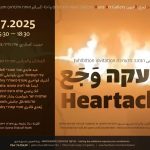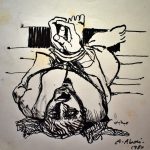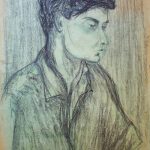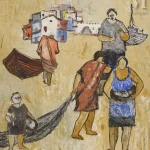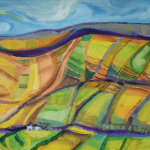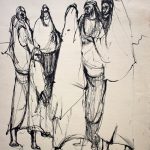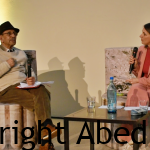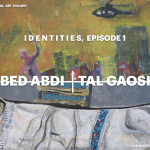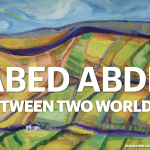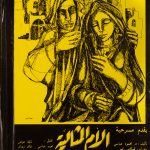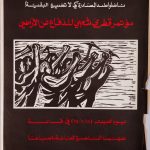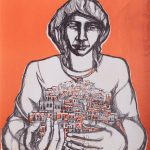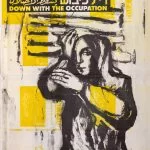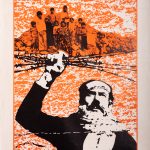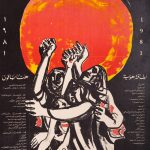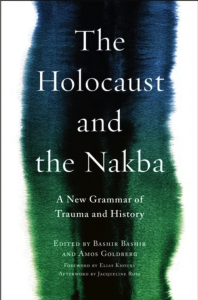

Edited by Bashir Bashir and Amos Goldberg. Foreword by Elias Khoury. Afterword by Jacqueline Rose.
Columbia University Press, Pub Date: November 2018

In this groundbreaking book, leading Arab and Jewish intellectuals examine how and why the Holocaust and the Nakba are interlinked without blurring fundamental differences between them. While these two foundational tragedies are often discussed separately and in abstraction from the constitutive historical global contexts of nationalism and colonialism, The Holocaust and the Nakba explores the historical, political, and cultural intersections between them. The majority of the contributors argue that these intersections are embedded in cultural imaginations, colonial and asymmetrical power relations, realities, and structures. Focusing on them paves the way for a new political, historical, and moral grammar that enables a joint Arab-Jewish dwelling and supports historical reconciliation in Israel/Palestine.
This book does not seek to draw a parallel or comparison between the Holocaust and Nakba or to merely inaugurate a “dialogue” between them. Instead, it searches for a new historical and political grammar for relating and narrating their complicated intersections. The book features prominent international contributors, including a foreword by Lebanese novelist Elias Khoury on the centrality of the Holocaust and Nakba in the essential struggle of humanity against racism, and an afterword by literary scholar Jacqueline Rose on the challenges and contributions of the linkage between the Holocaust and Nakba for power to shift and a world of justice and equality to be created between the two peoples. The Holocaust and the Nakba is the first extended and collective scholarly treatment in English of these two constitutive traumas together.
Contents
Foreword: Elias Khoury
Introduction: The Holocaust and the Nakba: A New Syntax of History, Memory, and Political Thought, by Bashir Bashir and Amos Goldberg
Part I. The Holocaust and the Nakba: Enabling Conditions to a New Historical and Political Syntax
1. Harbingers of Jewish and Palestinian Disasters: European Nation-State Building and Its Toxic Legacies, 1912–1948, by Mark Levene
2. Muslims (Shoah, Nakba), by Gil Anidjar
3. Benjamin, the Holocaust, and the Question of Palestine, by Amnon Raz-Krakotzkin
4. When Yaffa Met (J)Yaffa: Intersections Between the Holocaust and the Nakba in the Shadow of Zionism, by Honaida Ghanim
5. Holocaust/Nakba and the Counterpublic of Memory, by Nadim Khoury
Part II. The Holocaust and the Nakba: History and Counterhistory
6. When Genya and Henryk Kowalski Challenged History–Jaffa, 1949: Between the Holocaust and the Nakba, by Alon Confino
7. A Bold Voice Raised Above the Raging Waves: Palestinian Intellectual Najati Sidqi and His Battle with Nazi Doctrine at the Time of World War II, by Mustafa Kabha
8. What Does Exile Look Like? Transformations in the Linkage Between the Shoah and the Nakba, by Yochi Fischer
9. National Narratives of Suffering and Victimhood: Methods and Ethics of Telling the Past as Personal Political History, by Omer Bartov
Part III. The Holocaust and the Nakba: The Deployment of Traumatic Signifiers
10. Culture of Memory: The Holocaust and the Nakba Images in the Works of Lea Grundig and Abed Abdi, by Tal Ben-Zvi
11. Ma’abara: Mizraḥim Between Shoah and Nakba, by Omri Ben-Yehuda
12. From Revenge to Empathy: Abba Kovner from Jewish Destruction to Palestinian Destruction, by Hannan Hever
Part IV. On Elias Khoury’s Children of the Ghetto: My Name Is Adam: Narrating the Nakba with the Holocaust
13. Novel as Contrapuntal Reading: Elias Khoury’s Children of the Ghetto: My Name is Adam, by Refqa Abu-Remaileh
14. Writing Silence: Reading Khoury’s Novel Children of the Ghetto: My Name is Adam, by Raef Zreik
15. Silence on a Sizzling Tin Roof: A Translator’s Point of View on Children of the Ghetto, by Yehouda Shenhav
Afterword: The Holocaust and the Nakba, by Jacqueline Rose
Bibliography
Contributors
Index
About the Author
Bashir Bashir is Associate Professor in the Department of Sociology, Political Science, and Communication at the Open University of Israel and a senior research fellow at the Van Leer Jerusalem Institute. He is coeditor of The Politics of Reconciliation in Multicultural Societies (2008).
Amos Goldberg is Associate Professor and Chair of the Department of Jewish History and Contemporary Jewry at the Hebrew University of Jerusalem. His books include Trauma in First Person: Diary Writing During the Holocaust (2017).
Elias Khoury is a literary critic and novelist whose books include Gate of the Sun.
Jacqueline Rose is a professor of humanities at the Birkbeck Institute for the Humanities.
Subjects
- European History
- History
- Middle East History
- Middle East Studies
- Middle East Studies: History
- International Relations
- Middle East Politics
- Middle East Studies: Politics
- Judaism
ISBN: 9780231182973
424 Pages

